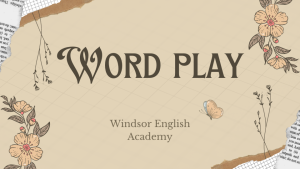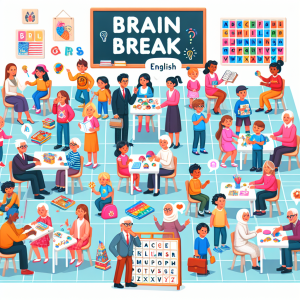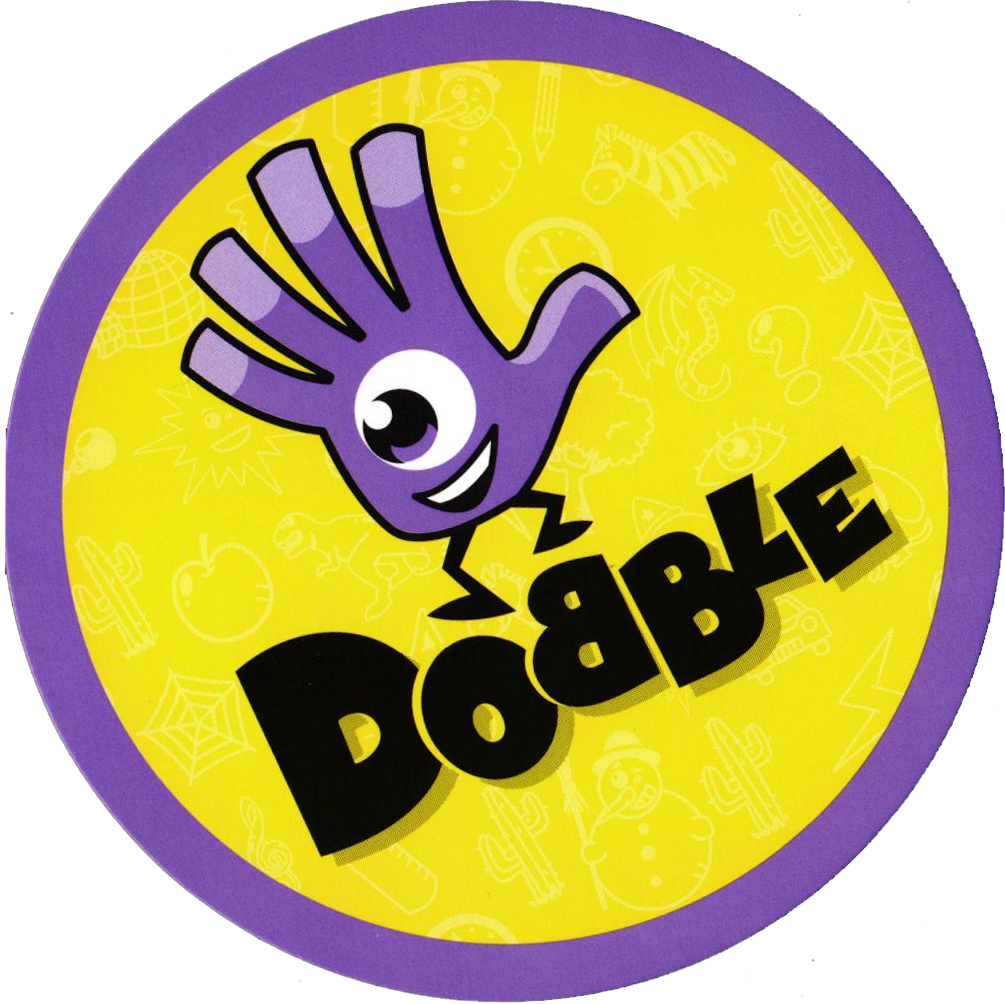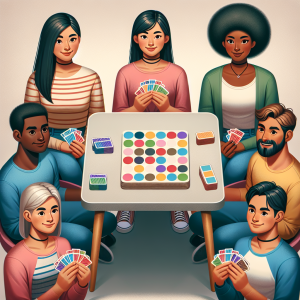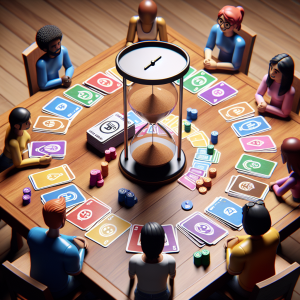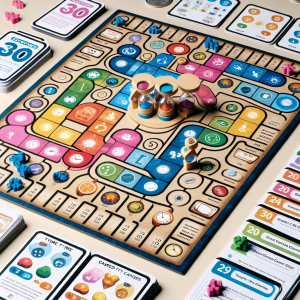Tongue Twister
Tongue twister games benefit language learners and those with speech impairments by refining pronunciation, enhancing phonetic awareness, and improving articulation. The challenging nature of tongue twisters encourages a clear and fluent speaking style, fostering overall language proficiency. These exercises also introduce uncommon vocabulary, expanding word knowledge. For individuals with speech difficulties, repetitive practice aids in refining motor control and coordination. The rhythmic patterns in tongue twister contribute to a natural speech flow, boosting conversational skills. Beyond linguistic advantages, engaging with these games enhances cognitive abilities like memory and attention. Importantly, the enjoyable nature of tongue twisters add a fun and motivating aspect to language practice.
Tongue twister games benefit language learners and those with speech impairments by refining pronunciation, enhancing phonetic awareness, and improving articulation. The challenging nature of tongue twisters encourages a clear and fluent speaking style, fostering overall language proficiency. These exercises also introduce uncommon vocabulary, expanding word knowledge. For individuals with speech difficulties, repetitive practice aids in refining motor control and coordination. The rhythmic patterns in tongue twister contribute to a natural speech flow, boosting conversational skills. Beyond linguistic advantages, engaging with these games enhances cognitive abilities like memory and attention. Importantly, the enjoyable nature of tongue twisters add a fun and motivating aspect to language practice.
Word Play
Word cards are indispensable tools in teaching English as they aid vocabulary retention and comprehension. These compact cards contain essential information: a word on one side and its definition, pronunciation, or example sentence on the other. Through repetition and active recall, learners reinforce their understanding of words, fostering language acquisition. Word cards offer flexibility, enabling learners to study anytime, anywhere. They facilitate personalized learning, allowing individuals to focus on specific areas of difficulty. Moreover, word cards promote engagement and autonomy in learning, empowering learners to track their progress and set achievable goals. In essence, word cards are fundamental in building a strong English language foundation.
Word cards are indispensable tools in teaching English as they aid vocabulary retention and comprehension. These compact cards contain essential information: a word on one side and its definition, pronunciation, or example sentence on the other. Through repetition and active recall, learners reinforce their understanding of words, fostering language acquisition. Word cards offer flexibility, enabling learners to study anytime, anywhere. They facilitate personalized learning, allowing individuals to focus on specific areas of difficulty. Moreover, word cards promote engagement and autonomy in learning, empowering learners to track their progress and set achievable goals. In essence, word cards are fundamental in building a strong English language foundation.
Learning general knowledge is vital for several reasons. It enhances critical thinking and problem-solving skills by providing a broad understanding of various subjects. With a well-rounded knowledge base, individuals can engage in diverse conversations, making them more confident and sociable. This not only aids in personal relationships but also opens up professional networking opportunities. General knowledge also improves academic performance by providing a solid foundation for learning new concepts. Additionally, it fosters cultural awareness and empathy by helping individuals appreciate different perspectives and backgrounds. Overall, general knowledge equips people to navigate life more effectively and build meaningful connections.
Brain breaks are essential for students as they significantly enhance learning and overall well-being. These short, intentional pauses from academic tasks help to reduce cognitive fatigue, improve concentration, and boost productivity. When students engage in activities such as physical movement, deep breathing, or creative exercises during brain breaks, it stimulates blood flow and increases oxygen to the brain, which enhances cognitive function and memory retention. Additionally, brain breaks can reduce stress and anxiety, promoting a more positive and conducive learning environment. They also help in resetting the attention span, preventing burnout, and keeping students motivated. By integrating regular brain breaks into the learning schedule, educators can foster a balanced approach to education that supports mental health and maximizes academic performance.
Game Instructions Objective:
This fast-paced card game challenges players to quickly identify items within specified categories. The goal is to answer as many questions accurately as possible. The player with the most points at the end wins.
Setup:
The teacher or game leader selects a letter of the alphabet before each round. A card from the deck, displaying a category, is turned over.
How to Play:
Once the card is revealed, all players must name an object within the given category that starts with the selected letter. The first player to correctly call out an appropriate answer earns a point. Continue playing with new letters and categories for subsequent rounds.
Examples:
If the category card reads “Colors” and the chosen letter is “B,” players might call out “black” or “blue.” If the category card reads “Fruits or Vegetables” and the chosen letter is “A,” a player might call out “apple.”
Winning the Game:
The player with the most points at the end of the game is declared the winner.
Enjoy the game!
Various Games
The game Double can provide several benefits for players. Firstly, it enhances cognitive skills such as memory, attention, and problem-solving. Players need to remember the locations of matching cards, requiring concentration and mental agility. Additionally, it promotes social interaction and communication, as players often discuss strategies and share experiences during gameplay. Double also fosters patience and resilience, as players learn to persevere through multiple rounds and challenges. Moreover, it offers a fun and enjoyable way to learn and reinforce vocabulary, especially in language learning contexts. Overall, Double provides a holistic learning experience while entertaining players of all ages.
In modern teaching, integrating jokes as brain breaks is invaluable for maintaining student engagement and cognitive vitality. Prolonged periods of screen-based learning can lead to mental fatigue, hindering effective comprehension. Humorous interludes offer a welcome reprieve, breaking up monotony and reinvigorating learners’ focus. Laughter triggers the release of endorphins, reducing stress and uplifting mood, creating an optimal environment for knowledge absorption. Furthermore, jokes stimulate mental acuity, creativity, and interpersonal connection, fostering a well-rounded learning experience. In this digital age, where physical interactions are limited, humor transcends boundaries, fostering a sense of camaraderie and positivity among students and educators alike.
How to play BrainBox
- Study the picture for about 10 seconds.
- Scroll to the next card for the questions.
- Move back to the picture to verify if the answer is correct.
- The player with the most correct answer wins.
Charades, a popular word-guessing game, offers multifaceted benefits for reading, comprehension, and spelling skills. Players engage in active reading as they interpret written cues, fostering fluency and comprehension. Furthermore, the game necessitates mental visualization and understanding of the words or phrases being acted out, enhancing comprehension abilities. Through embodying words kinesthetically, players reinforce spelling patterns and structure, aiding in spelling proficiency. The immersive and interactive nature of charades provides a dynamic learning environment, promoting retention and application of language skills. Moreover, the game fosters creativity and critical thinking as players strategize gestures to convey meanings effectively. Charades can be adapted for various skill levels, making it inclusive for learners of all ages and abilities. Overall, charades serve as a playful yet powerful tool for reinforcing reading, comprehension, and spelling skills, offering a fun and engaging approach to language learning.
The “5 Second Rule” game is invaluable for English language learners as it enhances vocabulary recall, fluency, and quick thinking. Players must rapidly generate words within a short timeframe, promoting spontaneous language production and expanding vocabulary repertoire. Additionally, the game fosters confidence in speaking as players must articulate their responses under pressure, mimicking real-life communication situations. The fast-paced nature of the game also encourages learners to think on their feet, improving cognitive agility and linguistic adaptability. Moreover, the game is adaptable for various proficiency levels, making it accessible and beneficial for learners at different stages of language acquisition. Overall, the “5 Second Rule” game offers a dynamic and effective way to reinforce English language skills in an engaging and enjoyable manner.
The game “30 Seconds” is highly beneficial for English language learners due to its emphasis on rapid word retrieval and communication skills. Players must describe a given word or phrase within a short time frame, requiring quick thinking and vocabulary recall. This rapid-fire gameplay promotes fluency and enhances spoken language proficiency. Additionally, the game encourages creativity and linguistic flexibility as players find innovative ways to convey meanings efficiently. By providing a dynamic and interactive platform for language practice, “30 Seconds” facilitates active engagement with English vocabulary and fosters confidence in oral expression. Overall, the game offers an effective and enjoyable method for honing essential language skills crucial for real-life communication.


